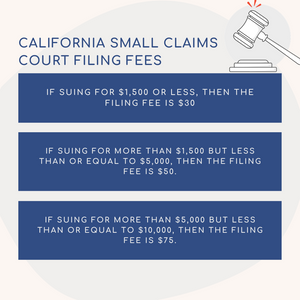Contents
Do you want to know what to expect in a small claims court hearing? Look no further. In this article, we provide an overview of what a typical small claims court hearing is like in California.
In this article, learn about:
Small Claims Court Limits.
How to prepare for a Small Claims Court Hearing
What to expect during the Hearing Day
Small Claims Mediation
Fun fact, lawyers are not allowed at the initial small claims hearing! This is to even the playing field so that each party has an equal chance of obtaining justice.
The Importance of Evidence for Your Small Claims Hearing
California Small Claims Court Limits 
This is also known as the "small claims court limits." In California Small Claims you can sue for the following maximum amounts:
What are the California Small Claims Court Filing Fees?
The amount you will pay to file a small claims lawsuit in California depends on how much you are suing for. You will pay between $30 to $75 to file the lawsuit. If cannot afford to pay court fees, you can ask the court to waive the fees.

What are other costs for Small Claims Court?
In most small claims cases, you can expect to pay:
Filing fees (see above) $30- $75
Serving Costs can range from $0-$75 per person you sue.
If you win, you can request that the losing party pay for your court fees and serving costs.
When will the hearing be?
Once the lawsuit is filed, the hearing will be scheduled within 20- 70 days.
You must serve the small claims lawsuit on the person you sued (the "defendant") at least 15 days before the hearing if the defendant lives or resides in the county you are suing in. If the defendant resides outside of the county you are suing in, you must serve them at least 20 days before the hearing. If you run out of time to serve, you can submit a request to reschedule your hearing date.
How to prepare for a Small Claims Court Hearing?
To prepare for your small claims court hearing:
Research the law. If you are unsure about your case, conduct research about the law. You can also consult an attorney.
Prepare your evidence. Invoices, contracts, receipts, etc. You want to have your evidence organized with titles, dates, and why that piece of evidence is important. All your evidence should be geared towards showing the judge why you are correct.
Prepare what to say. During the hearing, the judge will ask the person suing why they are suing. The judge will then turn to the person that is being sued, why they should win the case.
Get your receipts for costs ready. For example, any filing fees and any process server costs. Make sure to let the judge know that you would like to be reimbursed for costs. Generally, whoever wins the case can be reimbursed for "reasonable costs."
Print enough copies of all your evidence. You will need at least three copies (one for you, one for the judge, one for the other side).
The Hearing
On the hearing day, you want to give yourself plenty of time to arrive at the courthouse, go through security, and find the courtroom. You don't want to be late!
Once you are in the courtroom
Once the courtroom is opened, the court clerk, sheriff, and judge will go through what to expect. You will be sitting in a room with other people who have filed small claims cases. You will get to watch the cases scheduled before your case.
If both parties show up:
Right before the hearing, the judge will ask you and the person you sued to show each other the evidence that they have brought with them.
The Judge will ask you why you are suing.
Then the person who is being sued will get to present their side of the story.
The hearing will last around 15 minutes.
The judge will ask you to show the judge the evidence you brought with you. Sometimes the judge will keep the evidence. Otherwise, you will get the evidence right back.
Very rarely a judge will tell you who won or lost immediately after the hearing. Instead, the judge will tell you that their decision will be mailed to them (usually takes a few weeks to two months or so).
If only you show up but the person you sued does not show up:
You still have to prove to the judge why you should win.
If only the defendant shows up:
The judge will close the lawsuit.
Are attorneys allowed in small claims court?
Attorneys are not allowed to represent you or the person you sued at the initial hearing.
If the person you sued appeals (meaning they lost and want the judge to decide again) then attorneys are allowed to represent the parties at the appeal hearing.
Small Claims Mediation
Some small claims courts offer free mediation on the date of your hearing.
What is mediation? Mediation is a meeting between both you and the person you sued conducted by a neutral third-party (a mediator). The parties will meet with a mediator, discuss their case, and try to reach a mutually beneficial solution. Both parties must agree to mediation and it cannot be forced on them.
When will mediation occur? The court clerk, judge, or sheriff will announce if there are mediators available that day. Usually, the judge will tell the audience that if you opt for mediation, you can try to mediate the case while other hearings are being conducted. If you finish the mediation early, then you get to "skip the line" and your case is processed faster.

Camila Lopez, Esq.
Attorney at JusticeDirect. Camila holds a law degree and is a certified mediator. Her passion is breaking down complicated legal processes so that people without an attorney can get justice.

